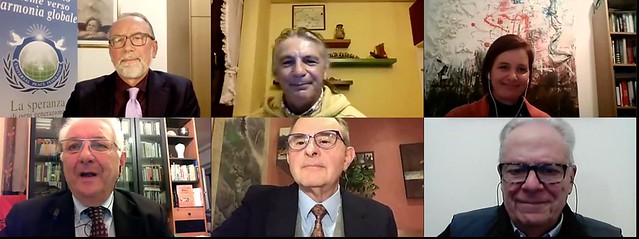Bergamo, Italy—The author of a book about Kim Jong-un and North Korea was the main speaker at a UPF webinar.
The online event was held on March 2, 2021, by the Italian chapters of UPF and its constituent association International Media Association for Peace (IMAP).
Katia Trinca Colonel, a journalist from the newspaper Corriere di Como and the ANSA news agency, opened the discussion by stating: "It is always a pleasure to be able to broaden the horizon and reflect not only on what is happening in Europe and Italy, but also on what is happening in the East. The pandemic has shown us how much the link with the whole world is getting closer and closer, how we are more and more interconnected and closer to each other."
Piergiorgio Pescali, a journalist and a great connoisseur of South and Northeast Asia, spoke about his book The New North Korea: How Kim Jong-Un Is Changing the Country.
More than for any other country, talking about North Korea requires the willingness to open one's mind and put aside prejudices and stereotypes, Mr. Pescali said. This is what he tried to do in his book, written in North Korea, a country he has visited many times since 1996, where he witnessed the transfer of power of the Kim dynasty and experienced firsthand the changes described.
"In order to know the history of North Korea and the Kim dynasty, one must go back to the history of the Korean Peninsula, to the separation that occurred at the end of World War II, when the Soviet Union and the United States found themselves managing the Japanese decolonization of the country," the author explained.
Reconstructing the historical events up to the Korean War, which ended with the armistice of July 1953, Mr. Pescali reminded us that even 70 years later, "between North Korea and the United States there is still an open act of war" because a peace treaty has never been reached.
The journalist illustrated the succession of the Kim dynasty, which has led North Korea since 1948 with Kim Il-sung, since 1994 with his son Kim Jong-il, and since 2011 with his grandson Kim Jong-un.
Speaking of the current North Korean leader, Mr. Pescali called him "perhaps the most astute and intelligent politician in the Northeast chessboard today. He spent several years in Switzerland, knows how the world works outside North Korea, and has masterfully managed to remove the military from the levers of power."
Today the country is led by a technocratic, civilian administration, Mr. Pescali said. Its Byunjin (dual-track) policy, i.e., increasing military power along with economic reforms, eliminating windfall funding to the military, is more functional to the strategy of deterrence. It allows for greater resources for economic and productive development, more diplomatic strength and greater consensus within the country. The new universities, including private ones, prepare not only economists and management experts but also engineers, agronomists and biologists.
The profits of industry are also divided among managers, and in the countryside the division of a good part of the harvest among the members of cooperatives is applied, Mr. Pescali said. There are family-run restaurants, bed-and-breakfast inns, hotels and bars. Real estate in Pyongyang has become a source of big business. "The economic vibrancy that Kim Jong-un has managed to give the country has revitalized it a bit until 2019. In 2020, COVID came along, and the North Korean economy downsized," he said.
On the violation of human rights, the author explained that it is one of the main plagues, as generally in all Asian countries, but that things are evolving. He said that the penal code has been reformed. “Only the offender is sent to re-education camps and not the whole family, as was the case in the past," he said. The death penalty is still administered. Mr. Pescali recalled how most Asian leaders contest the Universal Declaration of Human Rights, because it is a Western charter in which the individual is important, while in Asia it is society that is important. He added that Islamic countries also have a different concept of human rights.
Regarding the perception we have of North Korea, Mr. Pescali said: "There is a race to the bottom as far as information on that country is concerned, and for years there have been no valid reporters there. Now it is less complicated for journalists to enter North Korea, but the news, especially in Italian newspapers, is taken from the Internet, even from not very credible sources, and often it is just a copy-and-paste without verification. Many special correspondents, alas, prefer to describe stereotypes, because it is easier and attracts more attention from the reader. Sources are never checked, like the famous 120 dogs that allegedly mauled Kim Jong-un's uncle, which never existed."
As for political unification, he said: "No one has ever talked about it, and there won't be for at least 50 years. It does not suit either the North or the South, because there is too much inequality. We talk about an economic federation in order to balance the two economies."
At the conclusion of the meeting, Carlo Zonato, the president of UPF-Italy, recalled that UPF founders Rev. and Mrs. Moon both were born in North Korea. He listed three of their important projects: the Highway of Peace, an international artery that, starting in Japan, will cross all of Korea to connect China and Russia and then the whole world; a peace zone at the 38th parallel with parks and museums; and a new UN headquarters in the Demilitarized Zone.
Mr. Zonato spoke about Rev. and Mrs. Moon's historic meeting with Kim Il-sung in North Korea in December 1991. He mentioned that on the occasion of Reverend Moon’s death in September 2012, the North Korean government posthumously bestowed the National Reunification Award, its highest honor, in his memory.

